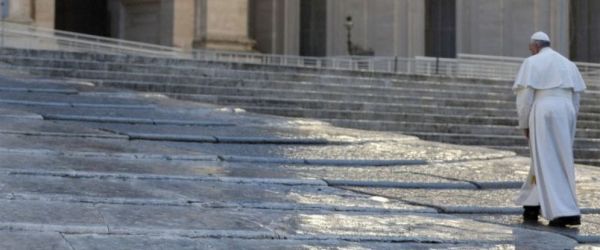In today’s Gospel passage (cf. Lk 9:51-62), Saint Luke begins the narrative of Jesus’ last journey towards Jerusalem, which ends at Chapter 19. It is a long journey, not only geographically and spatially, but also spiritually and theologically, towards the fulfilment of the Messiah’s mission. Jesus’ decision is radical and total, and those who follow him are called to measure up to it. Today the Evangelist presents us three characters — three cases of vocation, we could say — that shed light on what is required of those who wish to follow Jesus to the end, completely.
The first character promises him: “I will follow you wherever you go” (v. 57). Generous! But Jesus replies that the Son of man, unlike foxes that have holes, and birds that have nests, “has nowhere to lay his head” (v. 58). The absolute poverty of Jesus. Indeed, Jesus left his paternal home and gave up all security in order to proclaim the Kingdom of God to the lost sheep of his people. In this way Jesus pointed out to us, his disciples, that our mission in the world cannot be static, but is itinerant. The Christian is itinerant. The Church by her very nature is in motion; she does not stay sedentary and calm within her enclosure. She is open to the broadest horizons, sent forth — the Church is sent forth — to bring the Gospel through the streets and to reach the human and existential peripheries. This is the first character.
The second character Jesus meets receives the call directly from him, but replies: “Lord, let me first go and bury my father” (v. 59). It is a legitimate request based on the commandment to honour your father and mother (cf. Ex 20:12). Nevertheless, Jesus responds: “Leave the dead to bury their own dead” (Lk 9:60). With these deliberately provocative words, he intends to emphasize the primacy of following and of proclaiming the Kingdom of God, even over and above the most important realities, such as the family. The urgency of communicating the Gospel, which breaks the chains of death and ushers in eternal life, does not permit delays but requires promptness and complete willingness. Thus, the Church is itinerant, and here the Church is decisive, acts quickly, on the spot, without waiting.
The third character also wants to follow Jesus but on one condition: he will do so after bidding farewell to his relatives. And this is the response he receives from the Teacher: “No one who puts his hand to the plow and looks back is fit for the kingdom of God” (v. 62). Following Jesus excludes regrets and backward glances but requires the virtue of decision.
In order to follow Jesus, the Church is itinerant, acts promptly, quickly and decisively. The value of these conditions set by Jesus — itnerancy, promptness and decision — does not lie in a series of saying ‘no’ to the good and important things in life. Rather, the emphasis is placed on the main objective: to become a disciple of Christ! A free and conscious choice, made out of love, to reciprocate the invaluable grace of God, and not made as a way to promote oneself. This is sad! Woe to those who think about following Jesus for their own advantage, that is, to further their career, to feel important or to acquire a position of prestige. Jesus wants us to be passionate about him and about the Gospel. A heartfelt passion which translates into concrete gestures of proximity, of closeness to the brothers and sisters most in need of welcome and care. Precisely as he himself lived.
May the Virgin Mary, icon of the pilgrim Church, help us to joyfully follow the Lord Jesus and, with renewed love, to proclaim the Good News of Salvation to brothers and sisters.
[Pope Francis, Angelus 30 June 2019]












